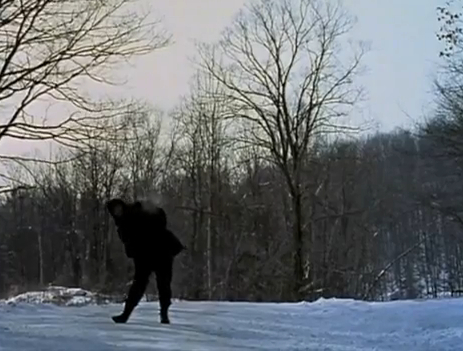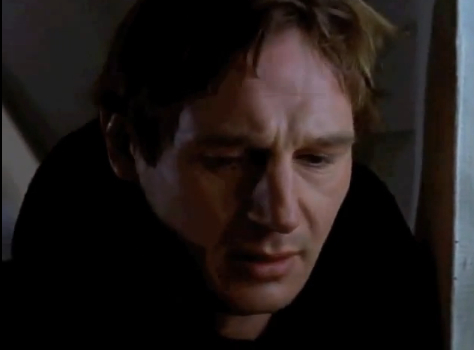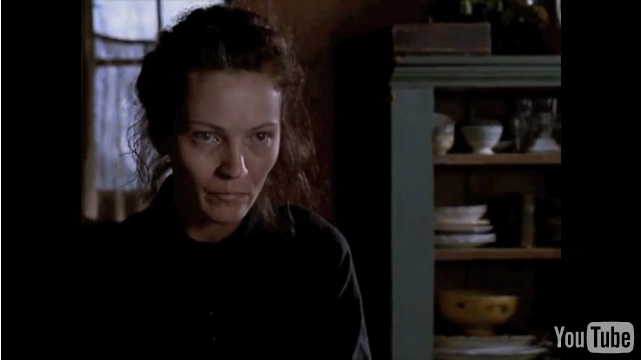The third and final installment of Professor C.’s Wharton web seminar series. Next month, he is considering “A Passage to India,” by E.M. Forster. Seemed fitting.
Ethan Frome is as cold as any book I know. I mean bone-chilling. It’s the same world as that of Wallace Stevens’s “Snow Man,” “spruces rough in the distant glitter/ Of the January sun,” an arrangement in black (winter nights) and white (ice and snow). Silver and grey and deep blue are the other colors. Only a crimson ribbon in Mattie’s dark hair, the “gay red” of Zeena’s pickle dish that Mattie unwisely takes off a high shelf to serve Ethan his favorite pickles, the red of Mattie’s blush, a “cold red” sunset, and the flicker of candles and fires light up the darkness. Winter in New England is a season I knew well when I was locked up (no, not literally) in boarding school in New Hampshire. It is harsh but has a subtle beauty, like the late paintings of Mark Rothko or – from another century — the tonalities of “An Arrangement in Grey” (a.k.a. “Whistler’s Mother”). Black and white and grey and silver bear the aura of time and thought. Will the film and its palette (I wonder) do it as well as Ethan Frome?
Ethan Frome is also a study in regional speech. Once I heard the story of an old New England farmer gossiping with a friend of mine, a summer visitor. Their subject was an editor of the local paper by name of Parker Merrill. “You know,” said the old farmer, “that man Paahkah Merrill, he’s so crooked, when he dies you can just screw him into the ground.” It might be a true story, though it’s the sort of thing non-New Englanders and non-Bostonians like to joke about, “paahk the caah in Haahvahd Yaahd.” Wharton has a wonderful ear, and the characters in Ethan Frome speak a rural New England English, in its distinctive rhythms, without parody or condescension.
Nothing is more pervasive than the tag, “I guess,” signifying that not much in life is for certain, or that the speaker knows the true story but doesn’t want to be forthright, or simply “I think.” Zenobia to Ethan, after Mattie’s arrival, “I guess you’re always late, now you shave every morning”; or “I guess I can make out to be home for dinner”; or “I guess it’s about time for supper”; or “I guess I’ll lay down on the bed a little while.” There are many more. Pronunciation and usage are on the mark: “wust” for “worst,” “fust” for first; “ain’t” for “isn’t”; “you’d ought to tell me, Ethan Frome,” for “you should have told me”; “ ‘I’d ‘a had two hours to wait in the station” for “I’d have had to”; you’ll ketch your death”; “it is powerful cold down here”; “this comes handy”; “I feel a little mite better”; and “don’t trouble, Ethan.”
When Zeena discovers that Mattie has used the red pickle dish for Ethan’s meal and the cat has broken it, she lashes out in a voice recalling the rhythms of Biblical vengeance. Isaiah: “Behold, the Lord maketh the earth empty, and maketh it waste, and turneth it upside down, and scattereth abroad the inhabitants thereof.” Zenobia: “You wanted to make the supper-table pretty; and you waited till my back was turned, and took the thing I set most store by of anything I’ve got, and wouldn’t never use it ….You’re a bad girl Mattie Silver, and I’ve always known it. It’s the way your father begun, and I was warned of it when I took you, and I tried to keep my things where you couldn’t get at ’em – and now you’ve took from me the one I cared for most of all.” This stringing together of connectives (rhetorical handbooks call it “polysyndeton”) is a favorite of preachers calling down the wrath of the gods and is suited to the dark Calvinist stain, perhaps never to be washed away, on the New England mind.
How well (I wonder again) do Liam Neeson and Joan Allen and Patricia Arquette, Ethan, Zenobia, and Mattie in the film, handle New England speech, equally important as the palette, to the life of Wharton’s story? How well, that is, does the director John Madden (he’s English – not the football coach) recreate Wharton’s special effects? Films may or may not choose to replicate their originals, but it’s hard to imagine Ethan Frome being anything except the way it is in Wharton’s telling. Having lived in New England for the better part of twenty winters and with stark memories of the cold – the name of Ethan Frome’s town is Starkfield – I doubt that the film will be able to replicate the essential colors of local landscape and local speech that make Wharton’s story the vivid parable that it is. We’ll see.
**********************************************************
The film opens with a shot of Starkfield looking not at all stark. It is a postcard perfect New England village, complete with mandatory white church and tall steeple. We are in Peacham, Vermont, a town now described on its Website as “full of culture” and “the most photographed town in New England,” a good place for autumn foliage and, in short, about as far from any Starkfield you might imagine. Early in the film, a bar scene puts a few somewhat scruffy-looking locals on display, as if taken from the cast of “Northern Exposure,” but the mood of the town is largely benign, its inhabitants stern-looking but good-natured New Englanders. The ramshackle cottage of the Fromes is far from town, an outlying image of despair, not a symptom of general decay. Vincent Canby, then film critic of the New York Times, said in his review: “Anyone watching this movie will want to check out the availability of the local bed-and-breakfasts.” A good film of the past season was “Winter’s Bone,” a grim vignette of life in the Ozarks. It gets right what the film “Ethan Frome” gets wrong.
Soon after we see Starkfield for the first time, the prissy new preacher from Boston, who replaces Wharton’s visiting engineer as protagonist of the frame narrative, announces to a local gathering: “… the poverty… you would not believe your eyes in Boston… that we could allow such degradation…” He is speaking of the Irish in Boston, but in context, we wonder at first if he means Starkfield. It is oddly ambiguous. In any case, he sounds like an affluent American who’s been visiting an African village. Starkfield in the film is an enclave of sober citizens who might be appalled by Irish or African poverty. In the novel, life in Starkfield more resembles that of Irish degradation.
The story of Ethan’s frustrated education is as different in film and novel as the two Starkfields. Wharton: “Four or five years earlier he had taken a year’s course at a technological college at Worcester, and dabbled in the laboratory with a friendly professor of physics…His father’s death, and the misfortunes following it, had put a premature end to Ethan’s studies.” A technological college in Worcester isn’t an improbable fact of Ethan’s past (though I’m not sure what a physics professor does in a lab). In the film, one of the village elders asks at a gathering after the burial of Ethan’s mother: “What were you studying at Harvard, Ethan?” He answers: “Engineering,” adding that he didn’t get far but that “everybody” says he had a feel for it.
That a farm boy would have gone to Harvard from an impoverished New England town, whose inhabitants (we learn from another scene) have never been to Boston, is unlikely. That he would have studied “engineering” is equally improbable, and perhaps impossible. The Harvard curriculum was in flux in the late nineteenth century — but “engineering”? I don’t think that Ethan Frome or anybody else could have studied much engineering at Harvard. As Peacham, Vermont, is to Wharton’s Starkfield, so is Harvard to the technological college in Worcester. The novel and the film tell different stories.
The film “Ethan Frome” is neither dark and cold enough nor rural enough. And it doesn’t sound quite right. Liam Neeson, a good actor, sounds faintly Irish (as he is). Other actors do what they can with New England speech, but that consists mostly of dropping the final “g” in participles: “watchin’,” “waitin’.” The ubiquitous “I guess” of the novel goes completely missing. Without it, we are in some other world.
*Professor C., for those new to this series, is my father. Retired from his university career, he graciously agrees to steer Privilege to the right side of the cultural tracks.




19 Responses
Lisa, I have enjoyed this post. I must confess that I have only read the book. I now feel that it is alright that I skip the movie.
Thank you.
Nor have I seen the film, but the poem I was reminded of by the book was ‘Out, Out’ (http://www.internal.org/Robert_Frost/Out_Out_-_) for its harsh stoicism. Now I shan’t bother with the film, I guess. I look forward to your thoughts on E.M. Forster, Professor C.
i’m sorry to hear the film stumbled in so many ways; i do love a good, somber joan allen piece (is there any other kind?). i’m glad, in turn, to hear you appreciated “winter’s bone,” professor c; i thought it was wonderful.
I downloaded the book for my Kindle, but have yet to read it – my eldest son has gifted me with something far more plebeian that I am obligated to finish first.
I must say I’m disappointed the film does not live up to the book; I just adore Liam Neeson.
How can it be that I’ve never read Ethan Frome? Looking forward to it now. Thank you, Professor C.!
I can’t begin to tell you how much I enjoyed this post. Please thank the professor. I’m looking forward to his thoughts on “A Passage to India” with happy anticipation.
Darla
Your analysis was well worth my scrambling to download the book and read it over the weekend . . . thanks for drawing my attention to the colour, the passion shelved in form of a pickle dish, as well as to the polysyndeton’s (ah, those rhetorical figures and their polysllabic names) Biblical echo. And I’m not displeased to find that the film I never got to see was an unworthy adaptation of the novella. . .
Thanks so much for the post, and I’m looking forward to A Passage to India.
Ethan Frome is without a doubt my favorite Wharton. Haven’t read it in ages — it might be just the right antidote for a hot summer day. Assuming we have one of those at some point.
Thank you, Professor C. I’m truly enjoying this series & not only because of visuals like John Madden the coach directing Wharton movies.
I’m afraid that I’m a lost cause from a style perspective (though I read in the hope of education!), but my mind isn’t so hopeless.
Thank you, Professor. I’m off to download Ethan Frome for my Kindle.
Great post!
I studied this text for my sophomore year English class at Chatham Hall. It gave me a lot of perspective on regional speech, too. It was appropriate for the time of year we read it as well – January. Dr. Edmonds tried to get us into the text by watching that movie, too, and it just was so intense and gloomy with nature — plus she is a big Wharton fan!
Thank you for this thoughtful post. It is good to know I can skip the film but should re-read the book and also pop Winter’s Bone in the netflix queue.
My physics professor husband spends at least 20 hours each week in the lab. It’s mostly computers these days, but he also has a clean room and a lot of optics equipment.
“the dark Calvinist stain, perhaps never to be washed away, on the New England mind.”
And there it is.
Professor, thank you, and just one request: could you please go on a little longer in future lectures than you’ve been doing in these past three? I feel that I’m just getting warmed up when, wham, it’s over. Is your daughter holding you down to a certain number of words? If so, I shall speak to her…
One of my all time favorite books. Just heartbreaking.
I am enjoying delving into great literature on Privilege. Thank you for these posts.
Ethan Frome is a truly great American novel and while the film doesn’t live up to the book,so few films do, I think that it is definitley worth watching. Liam Neeson may not have the New England diction, but he does have the right look and attitude to portray Frome.
Just wanted to thank you all so much for your comments. It’s a pleasure to have you here.
Loved it!! Looking forward to A Passage to India!
Thank you.
Very interesting Prof C and I especially like the Whistler’s Mother analogy. I’ve only seen the movie and liked it. My Uncle ran American Playhouse for many years and I only remember him being excited about the cast and having the heavy snow hit just prior to filming. They shot it on a shoestring budget.